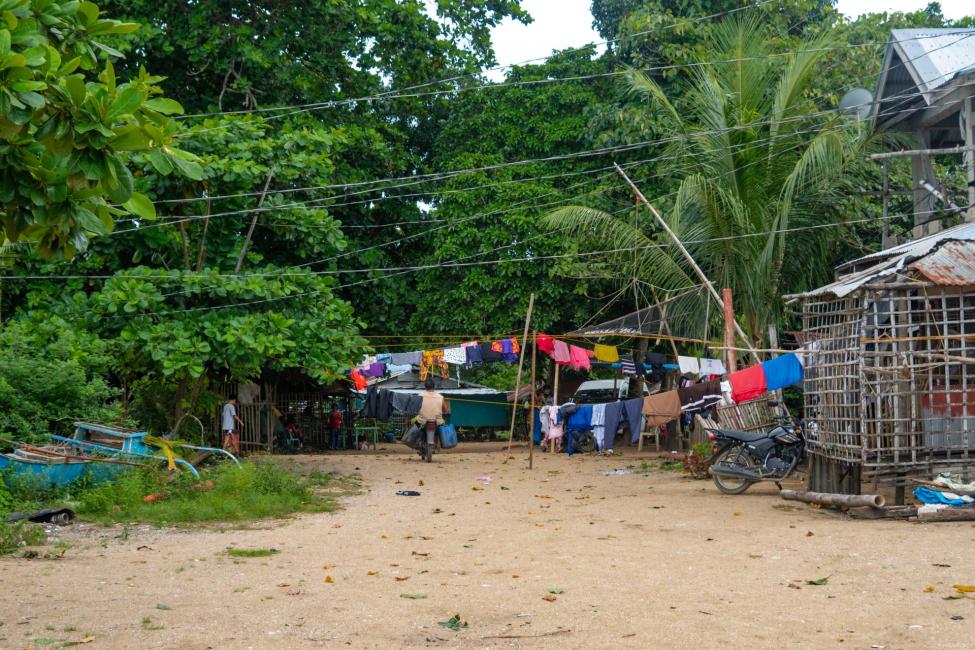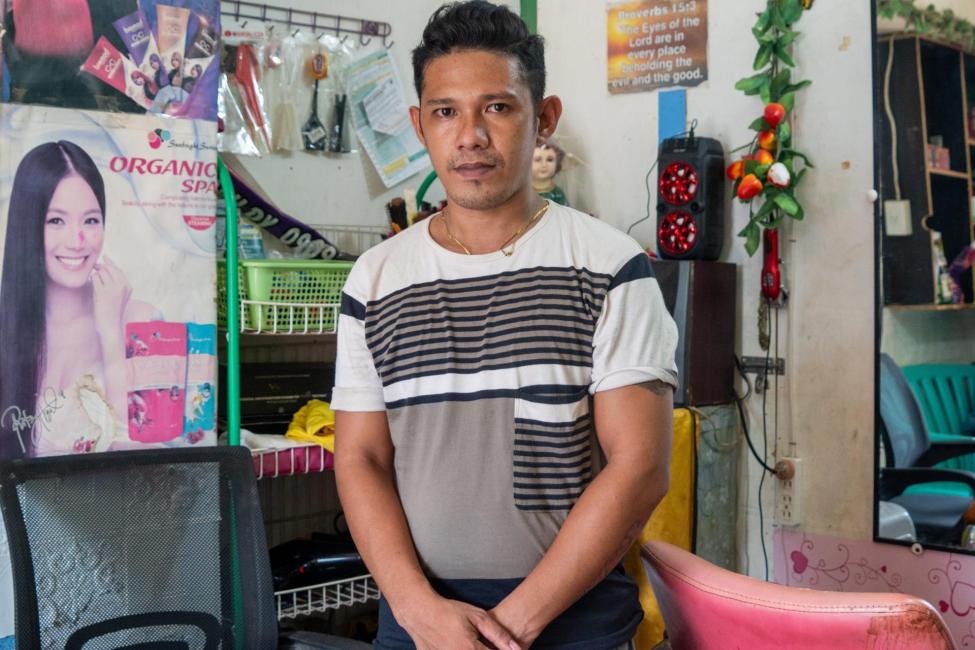-
Who We Are
WHO WE AREThe International Organization for Migration (IOM) is part of the United Nations System as the leading inter-governmental organization promoting since 1951 humane and orderly migration for the benefit of all, with 175 member states and a presence in over 100 countries. IOM has had a presence in the Philippines since 1975.
IOM Global
IOM Global
-
Our Work
Our WorkAs the leading inter-governmental organization promoting since 1951 humane and orderly migration, IOM plays a key role to support the achievement of the 2030 Agenda through different areas of intervention that connect both humanitarian assistance and sustainable development.
- Data and Resources
- Take Action
- 2030 Agenda
In Concepcion, Western Philippines, the sea paints a captivating scene for daily life. Against the canvas of high afternoons, small islands dot the coast, and turquoise waters are adorned with fishing boats while fishermen reel their nets. For locals like Baltazar, Charyl and Janrex, this is more than mere scenery, it represents their livelihoods and the promise of a better future for their families.
They didn’t think they would be trapped in its tides and had to pray for the day they return to the shore.
On the day Charyl celebrated the arrival of his third child, a mix of joy and worry filled his heart as he realized that his livelihood as a fisherman no longer provided enough to sustain his growing family. Limited opportunities in his small sea town, coupled growing economic pressures and the compounding effects of the COVID-19 pandemic, left Charyl’s family financially vulnerable.
An unexpected lifeline was presented when a fellow community member offered Charyl and his relatives Baltazar and Janrex, the chance to work on a sea vessel abroad. “He [recruiter] really enticed us with stories of higher salaries and decent work abroad. I waited patiently for months and had to quarantine for two weeks before I could work,” said Janrex.
As first-time Overseas Filipino Workers, Charyl, Baltazar and Janrex navigated unfamiliar processes guided by a recruitment agency and complicated pandemic-induced travel restrictions. Months turned into a year before they received the necessary documents for overseas work. However, their optimism waned when they discovered that the vessels listed on their documents did not align with the assigned locations.
Undeterred by the mismatch of information and driven by desperation for improved livelihoods, Charyl embarked on a journey to Senegal, Baltazar to Taiwan, and Janrex to Mauritius. This marked the start of their uncertain yet determined pursuit of a brighter future.
Caught in the grips of forced labour
Across different corners of the globe, a grim reality united Charyl, Baltazar and Janrex - grueling 20-hour-workdays, meager sleep, two daily meals, water scarcity, zero overtime pay, and no access to medication and medical services.
The extremely harsh working environment left them exhausted and overworked, taking a toll on both their physical and mental well-being. “I initially thought this was usual for seafarers, that endurance was part of the job. It took the tragic death of a co-worker from exhaustion for me to realize that these conditions were not right,” said Baltazar.
Baltazar’s nightmare extended beyond the seas as he discovered that his family wasn’t receiving the remittances allocations from the recruitment agency. Instead, irregular disbursements of inconsistent amounts became the norm.
Meanwhile, Charyl battled sickness without respite. Denied medical care, he was forced to work through illness, even enduring physical injuries. Desperate for help, he was granted a phone call to his recruitment agency but turned to his mother for help. “I was so tired and homesick, and I thought of jumping off the boat. When I asked for help from the recruitment agency, they told me to just bear it. Distraught, I called my mother to help me come back home,” said Charyl.
This harrowing experience exposed the three men to the grim realities of their employment journey: inaccurate documents, signatures of incomprehensible papers, certificates for a pre-departure orientation seminar never attended, and the endurance of brutal working conditions. Charyl, Baltazar, and Janrex became unknowing victims of exploitative recruitment practices and coerced into forced labour.
Every year, the Philippines sends thousands of sea-based migrants for overseas employment. According to the Department of Migrant Workers, nearly 340,000 sea-based migrants were deployed from January to September 2023. Despite accounting for only 20 per cent of yearly deployments among Overseas Filipino Workers (OFW), the International Organization for Migration (IOM) reports that sea-based workers remit bigger amounts than land-based workers, reflecting their higher wages. In fact, Filipino seafarers are required by law to remit at least 80 per cent of their monthly earnings, with many respondents remitting at least twice the Philippines' monthly minimum wage. While most of these migrant workers benefit from higher pay and improved working circumstances, many are victims of unlicensed recruitment agencies.
Finding hope in homecoming
While many balikbayans (returning overseas Filipinos) are embraced with warmth upon their homecoming, Charyl’s return took and unexpected turn. Confined to a hospital bed, he struggled to receive his owed salary and allowances, facing increased financial strain. This was when he was referred to Atikha Overseas Workers and Communities Initiative, a local organization dedicated to supporting overseas Filipino workers and their families left behind.
Charyl, Baltazar and Janrex engaged in orientation seminars and training sessions conducted by the local government and Atikha. These sessions helped them understand their labour rights, offered livelihood solutions, empowered them with the tools for sustainable reintegration, and make more informed migration decisions. “The next time I decide to work abroad, I am going to make sure to double-check my contract and ensure that the correct recruitment process is conducted,” Janrex said.
Through Atikha and with support from IOM, all three men underwent reintegration and financial planning seminars to enhance their financial literacy as they transitioned to new income sources in their hometowns. Charyl, Baltazar and Janrex are still seeking compensation for claims against the recruitment agency. In the meantime, they have returned to fishing as their means of livelihood.
“I am okay with where I am now, and I just need to focus on repaying my family’s debts. I am still open to working abroad but not anytime soon. I need to make sure that, this time, the offer is legitimate, and the benefits really outweigh what I have with my family here at home,” said Baltazar.
With accurate information on regular pathways, they know they can help shape their community’s narrative on migration. They have seen the harrowing possibilities of irregular routes but have also found migration’s great potential through safe and dignified opportunities, from home shore to open seas.
____________
The COVID-19 crisis had devastating impacts on labour migrants around the world. Despite their essential contributions to the socioeconomic development of their destination countries and their support to communities back home, migrant workers faced extreme vulnerability and were often the first to lose their jobs and social protections during the pandemic. The precariousness of their situation and economic uncertainty continued, with many returnees still unemployed three months after their return.
As part of its COVID-19 response efforts, IOM partnered with three civil society organizations across the Philippines and provided 191 OFWs with needs-based support and services to assist them in their reintegration. The direct assistance was made possible by the funding support of the Swedish International Development Cooperation Agency through the Corporate Responsibility to Eliminate Slavery and Trafficking Programme, which aims to uphold the human and labour rights of migrant workers in key sectors and migration corridors in Asia and the Pacific.



